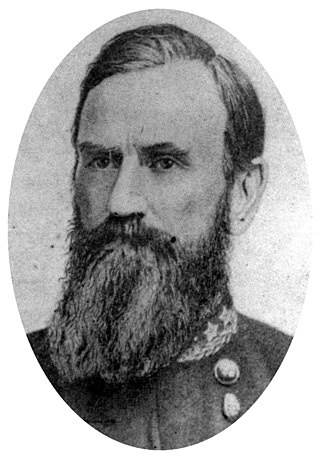Benjamin G. Humphreys
American politician From Wikipedia, the free encyclopedia
Benjamin Grubb Humphreys (August 26, 1808 – December 20, 1882) was an American politician from Mississippi. He was a general in the Confederate States Army during the American Civil War and served as Governor of Mississippi from 1865 to 1868, during Reconstruction.
Benjamin Humphreys | |
|---|---|
 | |
| 26th Governor of Mississippi | |
| In office October 16, 1865 – June 15, 1868 | |
| Preceded by | William L. Sharkey |
| Succeeded by | Adelbert Ames |
| Member of the Mississippi Senate | |
| In office 1839–1844 | |
| Personal details | |
| Born | August 26, 1808 Claiborne County, Mississippi Territory, U.S. |
| Died | December 20, 1882 (aged 74) Jackson, Mississippi, U.S. |
| Political party | Democratic |
| Signature | |
| Military service | |
| Allegiance | United States Confederate States of America |
| Branch/service | Confederate States Army |
| Years of service | 1861–65 |
| Rank | |
| Commands | 21st Mississippi Infantry Regiment Humphreys' Brigade |
| Battles/wars | American Civil War |
Early life
Humphreys was born in Claiborne County in the Territory of Mississippi, on the Bayou Pierre. He was educated in New Jersey and enrolled at United States Military Academy in the same class as Robert E. Lee and Joseph E. Johnston. However, he was expelled in 1826 when he participated in a "Christmas frolic" that ended up turning into the Eggnog Riot.
Upon his return to Mississippi, he was elected to the state senate representing his native county, serving from 1839 to 1844. In 1846, he moved to Sunflower County, Mississippi, and founded Itta Bena. He developed a cotton plantation there.
Civil War
During the American Civil War, Humphreys raised a company and was commissioned a captain in the Confederate States Army in 1861. Part of the 21st Mississippi Infantry Regiment, he was elected to the rank of colonel the same year and brigaded with other regiments under the command of Brig. Gen. William Barksdale in the Eastern Theater. At the Battle of Gettysburg in 1863, Humphreys's regiment was part of the force that attacked U.S. Army positions at the Peach Orchard, driving the U.S. soldiers back toward Cemetery Ridge. Humphreys took command of the brigade after the death of Barksdale. He was subsequently promoted to brigadier general,[1] and remained in command until he was wounded in the battle of Berryville, Virginia, on September 3, 1864. Humphreys returned home to Mississippi to heal but could not return to active duty before the war ended.
Political career
Summarize
Perspective
Confederate surrender in 1865 was followed by Reconstruction of state governments. Secessionist officials and military officers were forbidden to hold public office in the United States unless pardoned. Benjamin Humphreys was unpardoned when he announced his candidacy for Mississippi governor as a Democrat. President Andrew Johnson did not want him elected and refused to pardon him. Humphreys persisted in his candidacy, won the election on October 2, 1865, and was inaugurated and sworn in as Governor on October 16. On October 26, provisional Governor William L. Sharkey received from President Johnson a pardon for Humphreys. Humphreys won re-election to a second term in 1868.
However, Republicans in Congress took control of Reconstruction, and on June 15, he was physically removed from office by soldiers of the U.S. Army.[2]
As a Democratic Governor of the State of Mississippi, he professed the ideology of White supremacy. In his own words:
The Negro is free, whether we like it or not; we must realize that fact now and forever. To be free, however, does not make him a citizen, or entitle him to political or social equality with the white race.
After he retired from politics, Humphreys entered a career in insurance in Jackson, Mississippi. He continued there until his retirement in 1877, when he moved to his plantation in Leflore County, Mississippi, where he died in 1882. He is buried in Wintergreen Cemetery, Port Gibson, Mississippi.[3]
Humphreys County, Mississippi, is named after him. His son, Benjamin G. Humphreys II, was a United States Representative from Mississippi.
See also
Notes
References
Wikiwand - on
Seamless Wikipedia browsing. On steroids.
